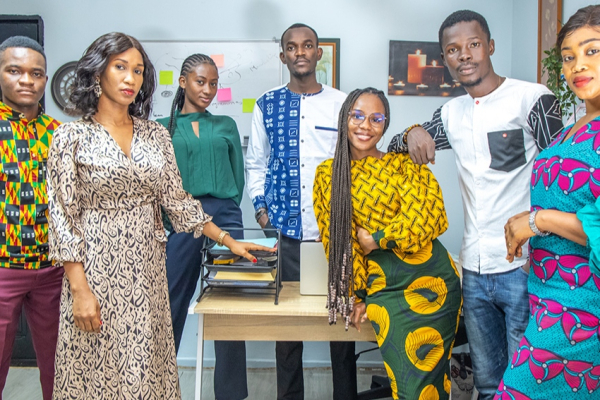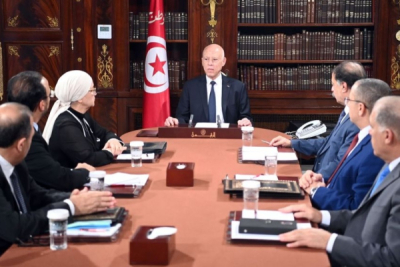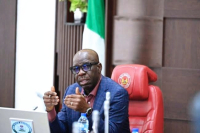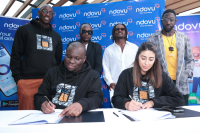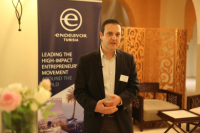The entrepreneurial landscape in Africa is thriving, offering startups opportunities for funding and increased visibility. Africa's Business Heroes plays a pivotal role in achieving this objective by identifying entrepreneurs and actively supporting their growth journey.
Kigali recently hosted two days of intense competition among 20 African innovators at the Africa's Business Heroes (ABH) Semi-Finals. Three female-led startups stood out among the contest’s top 10 finalists, a significant achievement for gender diversity.
The three women are Bola Bardet (pictured) from Benin, Christina Gyisun from Ghana, and Nthabiseng Mosia from South Africa. They respectively operate in the healthcare, agriculture, and energy sectors.
Bola Bardet is the CEO and Co-Founder of Susu, a startup that revolutionizes healthcare by offering healthcare packages and insurance that diaspora Africans can finance for their relatives in three African countries - Cote d'Ivoire, Senegal, and Gabon.
Christina Gyisun is the CEO and Co-Founder of Sommalife Limited. Her company empowers smallholder farmers in Ghana through advanced software technology, connecting them to global food and cosmetic manufacturers.
Meanwhile, Nthabiseng Mosia is the CMO and Co-Founder of Easy Solar, a startup that provides financing for high-quality solar systems and appliances to those without grid access, with flexible payment options. Mosia operates Easy Solar in Sierra Leone.
These women join other finalists from Egypt, Kenya, Morocco, Nigeria, Rwanda, and South Africa, spanning diverse industries.
The top 10 finalists will compete for a share of $1.5 million at the ABH Grand Finale in Kigali in November. The winner gets $300,000, the first runner-up $250,000, and the second runner-up $150,000. The remaining seven finalists will each receive $100,000, with $100,000 for additional training programs.
Africa's Business Heroes (ABH) is the Jack Ma Foundation's program that aims to nurture African entrepreneurs. Launched in 2019, it identifies, trains, and provides grants to outstanding African entrepreneurs. Jack Ma, Founder of Alibaba Group and the Jack Ma Foundation, created the initiative after witnessing Africa's entrepreneurial potential during his 2017 visit.
“At ABH, we have long recognized the potential of entrepreneurs as engines of economic and social growth. Now in the fifth year of the competition, we are encouraged to see that ABH has grown into a truly pan-African initiative that is positively impacting the continent’s entrepreneurship landscape,” said Zahra Baitie-Boateng, ABH head of partnerships and programs.
As the ABH Grand Finale approaches, the world eagerly awaits the impactful solutions and innovative visions these finalists will present, shaping a brighter, more inclusive African business landscape.
Hikmatu Bilali
TOogueda strives towards the creation of an entrepreneurial ecosystem conducive to growth in Guinea. It supports the emergence of a new generation of entrepreneurs, therefore contributing to the creation of added-value and decent jobs as well as wealth generation.
TOogueda is a platform focused on the development of start-ups, and micro, small, and medium-sized enterprises in Guinea. Founded in 2018, it is led by Fanta Diaby Sidimé, a Guinean-born investor and entrepreneur. It supports entrepreneurs, which boosts the real economy, to help foster the sustainable growth of their businesses through innovation.
The organization offers a range of solutions to support business growth. These include acceleration programs such as Boost, which helps entrepreneurs structure and solidify their business models, and facilitates networking. This program has already supported 53 companies and is currently monitoring 10 entrepreneurs.
TOogueda also facilitates access to business financing. In partnership with financing players both within and outside Guinea, it offers tailored solutions such as grants, recoverable advances, or simple loans. To date, it has financed over 100 companies in sectors like technology and the digital, the cultural industry, crafts, tourism, and catering, among others.
The organization has set up a platform, called NOos, for the companies it supports. This platform is structured as a community of creators and entrepreneurs from various sectors of the Guinean economy, offering an environment and essential resources to guide its members towards success.
It also provides entrepreneurs and business leaders with coworking services, individual offices, brainstorming or meeting rooms, and even relaxation areas to boost productivity. TOogueda also offers event space for conferences, workshops, exhibitions, presentations, seminars, and networking evenings.
Melchior Koba
Upon returning to her native Ethiopia after her engineering studies in India, Samrawit Tarekegn discovered the challenges faced by women who were passionate about their careers but still needed to take care of their children. She then decided to set up what she describes as "The Uber for Nannies" to address those challenges.
Mogzit In-Home Care is a technological solution developed by an Ethiopian start-up. It connects nannies with parents looking for people who will look after their children. The Addis Ababa-based start-up behind the app was founded in 2021 by Samrawit Tarekegn, Tigist Alene, Rahel Tarekegn, and Biniam Asnake. It aims to provide “flexible and convenient home service [...] at an affordable cost.” Its nannies are trained to, among other things, prepare meals, help with homework, tidy up children's areas, or administer medication with parental consent.
“As the youngest child in my family, I witnessed my older sisters, who are married and passionate about their careers, struggling to find reliable and consistent childcare when they returned to work after giving birth. [...] One of my sisters was forced to leave her child with neighbors whenever she went to work,” explains Samrawit Tarekegn, the originator of the Mogzit In-Home Care idea.
For the time being, the startup has no mobile app for its solution. Users must therefore access its services through its web platform. They can browse the profiles of the over 350 nannies listed on Mogzit In-Home Care. To book one, a user needs to press the "Book a Nanny" button and click on the profile of one of the many nannies on the page. They then click on the "See details" button to see all the information on the chosen nanny. This includes name, surname, age, languages spoken, neighborhood, rates, etc.
If the user validates the profile, he or she can go ahead and book the nanny. Then, the user needs to provide all their information on the platform, including the number of children to be looked after and their place of residence. "Following the booking, our team arranges an in-person or virtual interview in our presence to go over the needs of the parent as well as the services to be provided by the nanny. If an agreement is reached, a legal contract is signed between the two," says Samrawit Tarekegn.
In addition to the on-demand nanny service, the startup also offers on-demand cooks, tutors, and housekeepers services. It wants to introduce other profiles to provide even more comprehensive services.
"Currently, Mogzit is actively registering college graduates in Clinical Nursing, Social Work, and Psychology onto our platform, thereby expanding our workforce. Such graduates can come aboard Mogzit if they meet the criteria," said Samrawit Tarekegn.
Adoni Conrad Quenum
The debate on the impact of artificial intelligence on development in Africa gathered pace late last year. The opportunities and threats it represents are now being scrutinized by experts and organizations.
Artificial intelligence (AI) can be a formidable asset for international peace and security, according to the United Nations Development Program (UNDP). The UN body supports this position given the rapid pace at which conflicts are evolving, and the vast amount of data generated, which human beings are unable to process efficiently for effective decision-making processes.
The UNDP believes that "artificial intelligence can help us understand and even anticipate the onset and evolution of a crisis." But it must be combined with a human touch. Indeed, the international body is certain that Human-in-the-loop AI (HITL) –a process that combines the power of machine learning with human intelligence to solve complex problems– can improve data analysis in radically changing circumstances.
In Africa, where social networks have become privileged tools of expression, and where misinformation and hate speech are on the rise, as is communication from extremist groups, AI will help enhance watchfulness. Especially on platforms such as "Facebook and Twitter, which have been unwilling or unable to address these fundamental vulnerabilities," says the UNDP.
"These companies are often unable to consider the cross-platform impacts of their policies and user behaviors. They lack the resources (and internal incentives) to understand the impact of technology in a non-Western context and, to date, have been unwilling to share the metrics needed to properly assess the effects of their policies and interventions," laments the organization in the August 2023 issue of its "Development Futures Series".
After the start of the Ukrainian-Russian conflict on February 24, 2022, Twitter, YouTube, and Facebook were actively used to report on events in real-time. They were also used as “weapons” to influence and shape opinions online. However, they have also proved useful for studying many aspects of the conflict, such as attacks on health facilities, minefields, and the use of banned weapons systems (e.g. cluster munitions).
For the UNDP, artificial intelligence systems can be tested within the UN, in a small number of country offices, or in other field operations to meet the needs of each context. The initial objective could be to expand prevention efforts in places where tensions are rising or to identify disinformation campaigns targeting humanitarian personnel. These tests could lead to the creation of a cutting-edge global platform for sharing artificial intelligence tools, tags, models, and algorithms.
Muriel Edjo
Last May, the government imposed new taxes aimed at increasing national revenues and reducing the budget deficit, in response to the current cash crunch.
The Blockchain Association of Kenya (BAK) announced on Friday, September 1, that it had officially filed a petition, in the High Court of Kenya, challenging the implementation of the Digital Asset Tax (DAT) introduced by the Finance Act 2023.
The new regulations, which came into force on September 1, impose a 3% tax on revenues generated by the transfer or exchange of digital assets in the country.
"Our petition aims to address concerns about the DAT’s impact on both our industry and the broader economy. Enforcement of this harsh DAT could potentially lead to adverse effects on the industry’s growth and innovation. The core focus of the petition is to thoroughly examine the legal and constitutional dimensions surrounding the imposition of this tax on digital assets. The matter will be mentioned before the court on September 28, 2023," states a BAK press release.
The petition introduced by the BAK comes a few months after a press release issued by the same organization, in which it set out seven reasons for opposing the digital asset tax. Among other things, BAK criticized the unclear classification of digital assets, the ambiguity surrounding transfers of digital assets, and the failure to take into account loss-making transactions.
According to Allan Kakai, BAK's legal and policy director, DAT was introduced as an income tax, but it is taxed on the gross value of the asset, not on gains and profits. This means that those in a loss-making position will still pay the tax.
The new tax regulations also require crypto exchanges, as well as those facilitating the exchange or transfer of digital assets, to retain tax deductions, and transmit them to the country's tax authority within 24 hours of the transaction.
For BAK, the government should review the texts, hence the request. Kenya is ranked 5th worldwide for peer-to-peer crypto transactions and 19th for cryptocurrency adoption, according to the Chainalysis 2022 report.
Samira Njoya
In Tunisia, legal actions will be taken against those who publish fake news on the Internet, the Ministries of Justice, the Interior, and Information Technology announced in a joint press release issued last August 23. The aim is to combat social media crimes and to dissuade the authors of fake news. "Anyone who contributes to or participates in the publication of a website or page subject to judicial control, in any way whatsoever, inside or outside Tunisian territory, is exposed," reads the press release.
Broadband Internet service provider Starlink has expressed its interest in conquering the African market by 2024. So far, the company has launched operations in five countries on the continent and is looking to do the same in Zimbabwe with plans to extend its reach to 23 African markets.
Starlink, Elon Musk’s satellite internet company, will have to comply with applicable regulations if it is to operate in Zimbabwe. The Postal and Telecommunications Regulatory Authority of Zimbabwe (POTRAZ) recently issued a warning to users and resellers cautioning them against using unlicensed operators and internet service providers based abroad.
According to the telecoms regulator, to launch operations in the country, Starlink can either apply for a license or partner with a local company registered as a public network operator. In this case, "the Satellite Operator and the local network Operator enter a Virtual Network Operator (VNO) agreement, that must be approved by the authority, to ensure that the public network operator meets legal and regulatory requirements stipulated in the license," POTRAZ wrote in a public notice.
In December 2022, Starlink announced the launch of its activities in Zimbabwe. On its website, Starlink indicated it was planning to start serving the region in the fourth quarter of 2023. So, for the regulator, if this timetable remains unchanged, the company should have submitted a license application by now.
Starlink's arrival in Zimbabwe is expected to boost the digital sector and provide high-speed Internet connection to the population, who constantly complain about the poor quality and high cost of Internet in the country.
Samira Njoya
Public service digitization is one of the goals that Nigeria has set its sights on in line with its digital economy development strategy. All Nigerian States have been working towards achieving that goal, to provide the people access to digital public services.
Edo State has fully digitized its administration, thus becoming the first State to do so in Nigeria. Godwin Obaseki (photo), Governor of Edo, recently broke the news to the State’s Assembly, urging them to follow the movement.
“Around six million documents have been digitally archived and the aim is for state operations, including interfacing with the public, to be launched and completed online,” said Obaseki.
“In the area of digitization, one of the conversations we'll have with you in a few weeks will be to ask what the legislative arm of this administration is doing in terms of digitizing the legislature. The executive branch is already wrapping up the digitization process,” he added.
The Federal government started the digitization of the Nigerian administration some years ago, and in January 2022, the former Minister of Communications and Digital Economy, Isa Ali Pantami, declared that the government had taken steps through the National Policy for a Digital Nigeria to ensure migration to paperless government by 2030.
Edo State, by taking the lead ahead of the country’s other states, hopes to become Nigeria’s digital hub. To this end, the State’s administration has been equipped with over 5,000 computers and fiber-optic connections have been installed in all government offices. It also plans to train its executives in digital skills.
Transitioning to the digital will make Edo’s administration faster, both relative to procedures and decision-making.
Samira Njoya
After several years in the global financial sector, three tech entrepreneurs decided to set up a fintech solution to facilitate investment in international markets for Africans regardless of their social level. That is how Ndovu was born.
Ndovu is a fintech solution developed by a Kenyan start-up. It enables users to save money and invest in global financial markets via a mobile application. The Nairobi-based start-up behind that solution was founded in 2020 by Radhika Bhachu, Ro Nyangeri, and Gianpaolo De Biase, three tech entrepreneurs with years of experience in the financial sector. The fintech's aim is to provide Africans with the tools they need to build their wealth.
The solution has a mobile app, available on iOS and Android. Users must first download it to create an account. Upon registration, they will be asked to answer a number of questions, after which Ndovu will help them define financial objectives and set up personalized investment portfolios. After that step, they can now invest in financial markets.
The startup has set up an online academy for its users who know nothing about finance. The academy offers tips and advice on investing and saving.
Ndovu also makes initial security picks to suggest interesting investments to its users.
“If you were to save $100 per month for 10 years in a bank account paying 2% per annum, you would earn $13,200. On the other hand, if you invest $100 per month for 10 years using Ndovu, into the S&P 500 fund, you could earn approximately $23,500,” explains Ro Nyangeri.
The minimum investment on Ndovu is 5,050 Kenyan shillings (around $35). The Android version of its mobile app has already been downloaded more than 50,000 times. Since its launch, the fintech has received several awards. Among others, it won the She Loves Tech competition in 2021 and was selected for the Google for Startups Accelerator the same year.
Adoni Conrad Quenum
The trained computer engineer has extensive experience in predictive analysis. His company Cognira helps wholesalers and retailers manage and optimize their promotions.
Hatem Sellami (photo) is a Tunisian computer scientist and tech entrepreneur. He graduated from the Georgia Institute of Technology in 1995 with a PhD in Computer Engineering, and from the Georgia Tech Scheller College of Business in 1996 with a Master's in Finance and Technology Management.
In 2015, he founded Cognira, an artificial intelligence company of which he is the CEO. Based in Georgia (USA), Cognira provides retailers and wholesalers with solutions dedicated to promotions management. It aims to simplify collaboration, analyze past results, and implement more innovative, more effective promotions.
By leveraging artificial intelligence and data science, his company designed PromoAI, an innovative solution that enables clients to plan, execute, analyze, and optimize promotions. Cognira promises clients an average of 8% increase in sales, 25% reduction in inventory waste, and a 15% margin increase. It has received several awards and distinctions. For instance, in 2019 and 2020, it was recognized, by Inc. Magazine as one of the fastest-growing private companies in the United States. In 2020, 2021, and 2022, the Financial Times also recognized it in the same category.
"Our efforts at Cognira to develop and foster a culture that provides value to our customers and our determination to bring innovation to Promotion Management are proving to be at the forefront of our success," said Hatem Sellami in March 2022 when the Financial Times announced Cognira as one of the fastest-growing companies of 2022 in the Americas.
Before Cognira, Hatem Sellami co-founded Predictix, a consulting firm specializing in predictive analytics, in 2005. Before the company was acquired in 2014 by IT company Infor, he grew its sales to over $20 million.
His professional career began in 1997 at Retek, a company specializing in retail forecasting, where he was a data scientist and head of demand forecasting until 2005.
Melchior Koba
More...
Biometrics has made great strides in Africa in recent decades, likely spurred by governments and international organizations, driven themselves by concern for efficiency.
The National Identification Agency of Togo (ANID) will launch next month a nationwide biometric identification census. The Agency disclosed the news on August 30, during a press conference.
The project will last seven months, a month in each region, except in the Greater Lomé region, the country’s most populated region, where it will take two months.
Silete Devo, ANID’s Director General, commented on the census: "Faced with this digital transformation, identification, or the allocation of a unique identification number (NIU) to every natural person becomes the necessary condition."
With a budget of $72 million, the project is partly financed by the World Bank, under the West Africa Unique Identification for Regional Integration and Inclusion program (WURI). The latter covers Togo, Benin, Burkina Faso, Senegal, Niger, and Ivory Coast.
In Togo, the project aims to proceed to the digital identification of 95% of the population. Each resident will be registered with biometric markers. These will include first and last names, photos, fingerprints, and irises.
Both nationals and residing foreigners (who have been in Togo for more than six months) will get a single 12-digit ID number. Ultimately, the project should streamline government services, improve the identification process, and give citizens a robust digital identity, propelling Togo further into the digital age.
Like many other African countries, Ghana wants to leverage technology to improve its economy. Since 2017, the current government has identified many sectors where digital tools will transform government efficiency.
Starting next year, Ghana will automate revenue collection at major tourist sites, Tourism Minister, Dr. Ibrahim Mohammed Awal (pictured), revealed at the Editor’s Forum held in Accra in mid-August. The transition marks a shift from a fully manual collection to a cashless system that is expected to enhance revenue generation and investment in the sector.
According to Dr. Awal, tourist attractions rely heavily on manual revenue collection but this will soon change with the cashless systems being first implemented at the newly renovated Kwame Nkrumah Memorial Park, before being “replicated nationwide at other attractions.”
By introducing automated revenue collection systems in its tourism sector, Ghana wants to capitalize on the experience of countries like Kenya and Tanzania that have achieved notable success in that segment. For instance, in Tanzania, the digital payment approach has helped curb embezzlement and streamline revenue collection.
If successful, the modern approach may get Ghana closer to its ambition to generate $5 billion from the tourism sector by 2025. In 2022, the sector generated $2 billion. This year, the country eyes $3.4 billion in revenue.
By 2025, it hopes to attract two million visitors yearly. To do so, it bets on private-sector partnerships and various initiatives including the modernization of cultural sites like the Dubois Centre and Osu Castle, along with positioning Ghana as a hub for Meetings, Incentives, Conferences, and Events (MICE) in the sub-region.
Hikmatu Bilali
DigiCow Africa Ltd has developed several digital solutions to help farmers. Among them, the DigiCow Dairy application, its major solution, has won several awards.
Digicow Dairy App is a mobile application developed by Kenyan start-up DigiCow Africa Ltd, formerly FarmingTech Solutions. It provides “verified, reliable, and timely information on animal husbandry” to farmers. The solution was launched by Peninah Wanja, a Kenyan practicing extension officer determined to address the challenges faced by farmers in her country after witnessing them firsthand.
“It's a gap that I saw because when you look at the statistics and what is on the ground, our government has provided one extension officer for close to 4,000 farmers. So, there is a need for these critical services,” the tech entrepreneur explains.
The Digicow app is available for Android devices only. Once installed, it enables farmers to register by providing all the necessary information on their livestock. Based on that information, Digicow assists the farmers in their various tasks by notably providing real-time reports and sending notifications concerning important cow breeding dates.
"The App is designed to use the data and feedback production, financial reports, breeding and health reports. The farmer has the option to access analyzed financial statements and receives important alerts such as dropped milk production, when to observe for heat signs, indicating a failed conception, and when to expect the cow to calf among other advisories," Digicow indicates, describing its Android app.
The app features a virtual training room, available 24 hours a day. The training room includes on-demand written audio and video content. There is also a real-time chat room where farmers can interact, exchange ideas, and discuss with group experts.
Thanks to the Digicow app, DigiCow Africa Ltd has set up an ecosystem to help farmers increase milk yields, ensure better herd health, and improve farm organization among other things. Digicow also has a lending mechanism designed to provide farmers with credit for personal and agricultural expenses.
In 2019, DigiCow was named Kenya's most innovative agritech in a World Bank challenge. It claims to work with over 200,000 farmers.
Adoni Conrad Quenum
Through its coaching program, coworking space, training, and mentoring among other things, Kobo Hub creates a favorable environment conducive to the growth of young businesses and startups in the region.
Founded in 2018 by Sidonie Latere, a Congolese serial entrepreneur, Kobo Hub is a startup accelerator based in DR Congo. It aims to accelerate the emergence and growth of local entrepreneurs with impactful projects.
The accelerator notably provides support to innovative entrepreneurs and companies with impactful solutions for African populations. It also provides entrepreneurs with a coworking space to enable them to work with others and grow their network. The well-equipped space features training and conference rooms for hire.
Through its Kobo Boost program, it offers training and mentorship programs to young startups and companies that need it. It also supports project leaders by providing a network of multi-disciplinary experts, and access to the skills, resources, and infrastructure essential to the success and growth of their projects.
Kobo Hub has a network of over 50 investors and more than 30 active mentors. It has already raised over $90,000 for accelerated start-ups and has access to over 50 entrepreneurs, incubators, and companies. As an accelerator, it has developed over four educational programs and organizes over 25 events a year. Its partners include the DR Congo Ministry of Foreign Affairs, the Organisation internationale de la francophonie and the Agence française de développement.
Some of its notable programs include Kobo Art, a 10-month incubation/acceleration program funded by the French Embassy to support entrepreneurs in the cultural and creative industries.
The accelerator has also developed a fintech solution, KobooPay, which enables e-tailers to generate a single-use or open-ended payment link. The link enables payment to be made by credit card, regardless of geographical location, or by mobile money. It also has an agent network that allows e-tailers to withdraw the funds received in cash.
Melchior Koba



